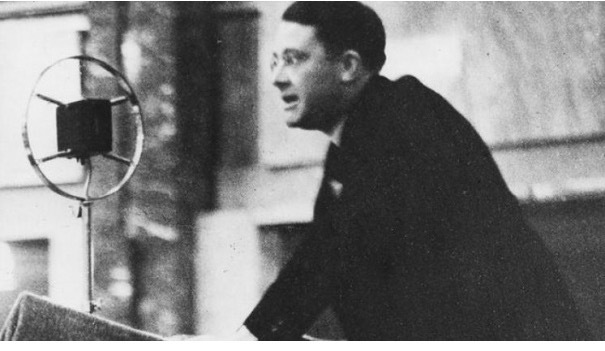Back to article index
Previous
THE KATECHON AND CARL SCHMITT

Carl Schmitt
The concept of the katechon as the force charged with restraining a collapse into anarchy was revived in the twentieth century by the German political and legal theorist Carl Schmitt who regarded it, in his book The Nomos of the Earth, published in 1950, as the only possible means of reconciling Christian belief in an imminent collapse into anarchy and irruption of the Antichrist with the continued existence of a powerful Christian Empire - in his case thinking principally of the Holy Roman Empire (thanks to John Minahane for providing me with a translation of the relevant parts of the Nomos). The Katehon website has an article by an American legal theorist, M.Blake Wilson [associate professor in the Department of Criminal Justice at California State University, Stanislaus] under the title: “Counterrevolutionary Polemics: Katechon and Crisis in de Maistre, Donoso, and Schmitt,” (originally published in the Philosophical Journal of Conflict and Violence, Vol. III, Issue 2/2019, December. The original is accessible on the internet). His starting point is the idea most commonly associated with Schmitt, the famous first sentence of his Political Theology: 'Sovereign is he who decides on the exception.' Wilson suggests three things that the three counter-revolutionaries, the Spanish Juan Donoso Cortes, the French Joseph de Maistre and the German Schmitt have in common:
first, the counterrevolutionary constitution and its role as katechon of revolutionary violence; second, the philosophy of the decision and the sovereign’s identity as the katechon personified; and third, bourgeois romanticism’s katechonic failure to engage in meaningful political action.
It is actually only Schmitt who uses the word 'katechon':
In Schmitt’s view, the katechon, while still retaining its theological/eschatological roots, becomes a secularized and historical concept whereby political entities (persons, empires, and institutions) can be understood as restrainers against revolution, chaos, and disorder, which are the political precursors of liberalism and socialism …
'The theorists fear that a revolutionary crack in the state’s façade will let in the Antichrist and its dark chaos. Liberalism’s weak state, as well as socialism’s strong state but weak society, also lets in the darkness. Together, the theories argue, the strong state and its religion restrain the Antichrist and return order: religion asserts internal control through guilt, hell, and perdition, while political organizations exert external control through constitutional law (at its most benign) and tyranny (at its most repressive).
'For Donoso, sin and evil are the result of disorder, and it is heresy to subordinate the religious to the political and the political to the economic. Politics, rather, must be subordinated to theology … Because man’s dark nature justifies his domination, myth, religion, and political compromise are better methods to relocate and secure order. The church as katechon saves the world from chaos whereas philosophy’s endless discussion cannot … For Donoso, dictatorship is the apogee of politics, and the fall of religion is directly proportional to the rise of politics, which he characterizes as repression and tyranny.'
He ascribes to Donoso the idea that Liberty, Equality, Fraternity should be seen as theological categories - 'the revolutionary dogmas of liberty, equality, and fraternity come not from “the Republic, but from Calvary.”'. We are all equal before God but 'When concepts such as equality are secularized, they lose their religious foundation and violence ensues.' All the writers are opposed to the idea of a written constitution which is an obstacle to the evolution, the history, of a people and which stands above the sovereign, interfering with the sovereign right to decide the exception. Much admiration is expressed, especially by Donoso, for the unwritten British constitution and the dictatorial nature of the power it gives Parliament: '“The English constitution is the only in the world (so wise are the English) in which dictatorship is not an exception in the law. It is in the common law. This matter is clear. The Parliament has dictatorial power on all occasions and at all times whenever it decides to exercise it.” Most interesting however, from our present point of view is Schmitt's critique of romanticism (in his book Political Romanticism, published in 1919):
'Schmitt echoes the Catholic de Maistre when he writes that “law, constitutions, and language are products of human society.” Society produces the nation, but nations have boundaries. The epitome of universalist romantic politics is the antithesis of this idea: without boundaries, “the unlimited community is essentially a revolutionary god that eliminates all social and political barriers and proclaims the general brotherhood of humanity as a whole.” Accordingly, Schmitt writes, “Any relationship to a legal or moral judgment would be incongruous here, and every norm would seem to be an antiromantic tyranny. A legal or a moral decision would be senseless and it would inevitably destroy romanticism. This is why the romantic is not in a position to deliberately take sides and make a decision.”'